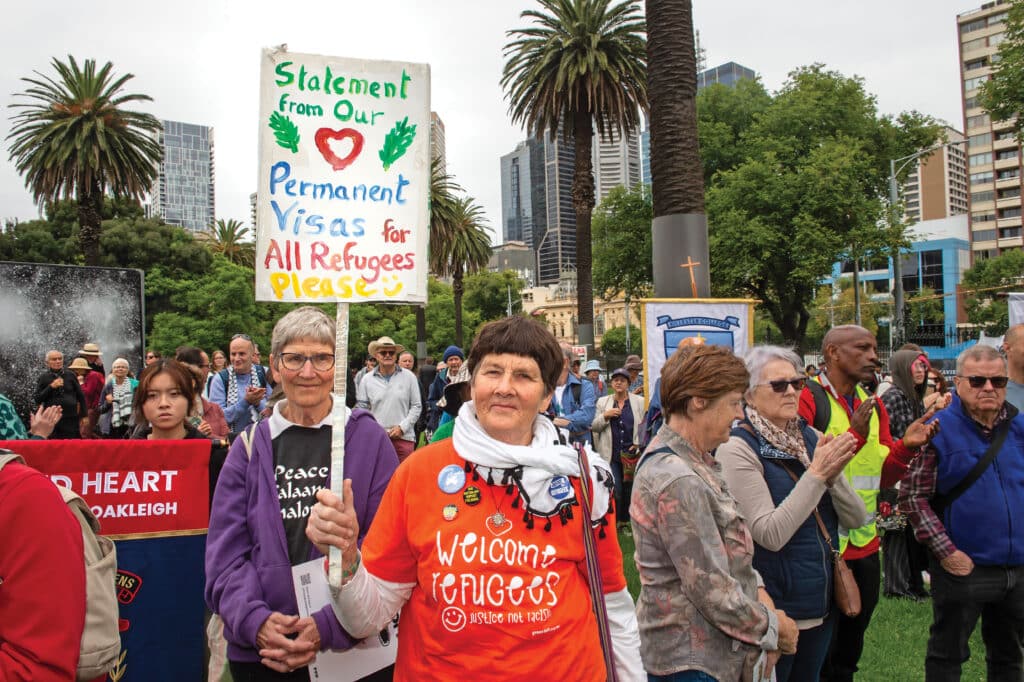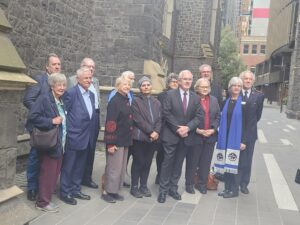
Jenan Taylor
23 August 2024
Anglicans are being urged to stand with asylum seekers and refugees calling for better pathways to permanency in Australia.
Hundreds of refugee activists have camped outside government and ministerial offices in capital cities across Australia for weeks in protest against visa insecurity.
Many have been in limbo in Australia for more than a decade because they were subjected to a “fast track” refugee determination process that denied them protection.
Melbourne diocese Social Responsibility Committee and Bishop Philip Huggins are advocating compassionate pathways to permanency for refugees after the federal government scrapped the fast track system in July.
They said many asylum seekers were mentally, emotionally and spiritually traumatised, and financially disadvantaged under the system because of the uncertainty it cast over their lives.
SRC member Dr Audrey Statham said the committee supported the refugee encampments, and believed Anglicans needed to stand in solidarity with the protestors.
“We need to acknowledge the pain of this vulnerable group of people who came here seeking our protection,” she said.
Read more: Act with ‘love’ for refugees: Vigil to pray for end to cruel treatment
Dr Statham said the SRC wanted a fair and better resourced merits review process, that included alternative pathways for permanency, to replace the fast track system.
She said it also wanted people seeking asylum to have access to basic income support so they could have dignity of life while they waited to have their cases resolved.
She said without better protections many asylum seekers faced destitution and poverty because temporary bridging visas gave them little or no access to health care and work rights.
University of NSW researchers found the fast track process had many flaws including longer and costlier delays, and more negative decisions on protection applications than other processes.
They revealed that most of the people subjected to the system came from countries where armed conflict and human rights violations were well-documented, including Iran, Sri Lanka and Somalia.
The researchers reported in early August that more than 9000 people who were refused protection under the process, and who lost court appeals, were still without permanent residency.
Tamil refugee and Melbourne-based protestor Rathi Barthlote said she came to Australia 16 years ago and was exhausted and heartbroken by the fast track process.
Ms Barthlote said her case was heard in court a few years ago, and although her immigration lawyer said she was cleared to live in Australia, her application was rejected again shortly afterwards.
Despite the cold weather, and being traumatised by neo-Nazi taunts, she was determined to stay encamped outside the home affairs department until the protestors were granted safety and freedom.
“I am scared, and we are mentally stressed, but we say to ourselves, ‘One day longer, one day stronger’. That’s what we think about,” Ms Barthlote said.
Bishop Huggins believed the home affairs minister needed to use his discretionary powers to give the 9000 refugees in limbo permanent residency.
Read more: We can bless refugees if we act together as Anglicans
He said he recently wrote to minister Tony Burke to exercise his Ministerial discretion for people in this situation, and urged Anglicans to do the same.
Bishop Huggins encouraged them to support their calls for intervention by asking their local federal parliamentary representatives to be bipartisan about pushing for compassionate visa policies.
He asked Anglicans to pray that Australia showed a united and compassionate face to the world’s displaced people, particularly on the Church’s Day of Prayer for Refugees coming up on Sunday 25 August.
A Department of Home Affairs spokesperson said each asylum seeker case was assessed on its merits, and took into account the individual circumstances of the case and the most current and relevant country of origin information.
The spokesperson said people who didn’t engage protection obligations, who were not awaiting a merits or judicial review outcome, and who had exhausted all avenues to remain in Australia, were expected to depart Australia voluntarily and might be provided assistance to depart.
For more faith news, follow The Melbourne Anglican on Facebook, Instagram, or subscribe to our weekly emails.







